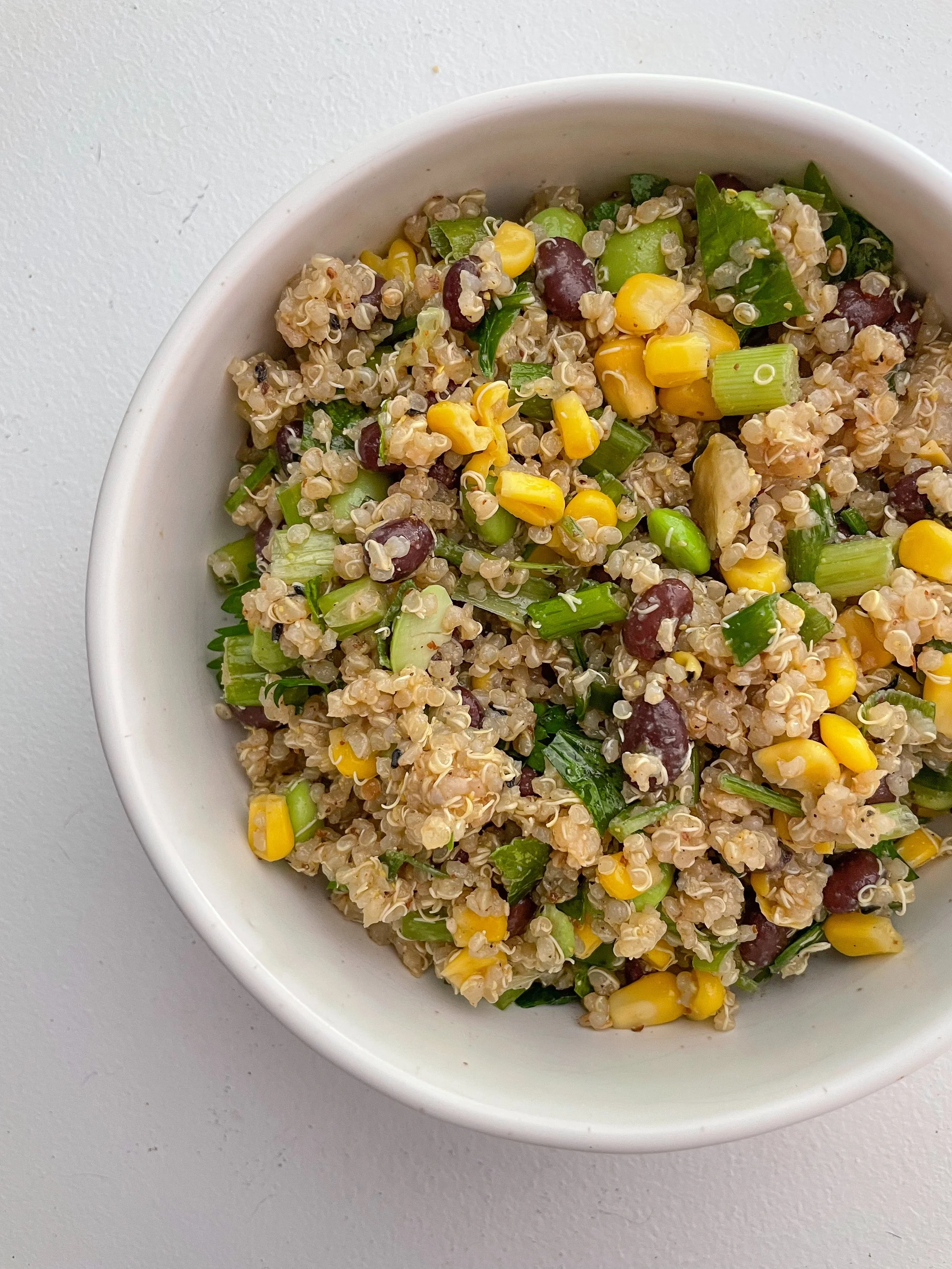Hypothyroidism & Hashimoto's Symptoms, Causes & Tips for Thyroid Health
I did a deep dive on everything hyperthyroidism, so it’s only logical, hypothyroidism is next up. The Thyroid Foundation in Canada says that 200 million people in the world have some form of thyroid disease. Thyroid Patients Canada boldly states we currently have no idea how many are actually suffering. Thyroid conditions effect more women and hypothyroidism is much more commonly diagnosed than hyperthyroidism.
Symptoms
hair, skin, nail changes
weight gain
fatigue
cold often
lower heart rate
constipation or sluggish bowel movements
yellow bumps on eyelids due to fat deposition
low mood, depression
Etiology
thyroid gland is making T4
inability to convert T4 into the more active form T3
or both low T4, T3, TSH often higher
radioactive therapy
thyroidectomy
having Hashimoto’s or autoimmune thyroiditis
To make T3 you need selenium, a well functioning liver, HPA axis that is balanced. Illness or autoimmunity can also impact the production of T4. The majority of your T3 is bound so it’s also important to test free T3 to see how much the body has available to use (this only makes up about 1%).
T4 loses an iodine molecule when doing the conversion to T3 and selenium acts as the coenzyme supporting the process.
It’s important to note the majority of people with thyroid imbalances do in fact have an autoimmune disease. It often gets missed as most doctors or endocrinologists don’t order the antibody markers. I had to pay for mine and my endo still refuses to check on my antibodies since being diagnosed.
You can also have mild subclinical hypothyroidism, meaning it may be in range on the western doctor’s chart, but on the low or high end of normal. More holistic practitioners use a more narrow range for thyroid test results so more people get supported through food, lifestyle and herbs. This is important to know as I often see clients with symptoms that feel defeated after their doctor said, ‘your lab work is normal.’ I like to see TSH around 2. mIU/L and under even though most doctors say up to 5 is healthy.
PSIf your reverse T3 is high, stress or illness are likely present.
Impacts on the Body
someone low in thyroid hormone, will also likely be low in HCL. This impacts stomach acid production and break down of foods
difficulty converting beta carotene to vitamin A
low iron, magnesium, calcium, zinc, copper because low HCL results in lower minerals
B12 deficiency (the DUTCH checks this, however I always encourage blood work with a Dr)
higher risk for osteoporosis
higher risk for insulin resistance or diabetes
high cholesterol as thyroid hormone is needed to remove cholesterol from the blood
constipation, can lead to an overgrowth of microbes
Prevention Tips
ensure you get adequate iodine from supplementation or seaweed. Note: if you have hyperthyroidism, you want to steer clear of more iodine. Iodine will help with brain fog and fatigue associated with hypothyroidism. If your plant-based, I would definitely ensure you’re hitting your daily quota. Check out Chronometer and track for a few days. The RDA for iodine 19 years and older is 150 mcg, during pregnancy it’s 220 mcg and lactation 290 mcg
take steps to reduce stress and support your nervous system. Chronic stress will turn tyrosine into norepinephrine and epinephrine - away from T4 and T3 production
deal with inflammation - similar to above - histamines can stimulate epinephrine release (love the GI-MAP that I offer to uncovering gut health)
nutrient depletion: we talked about iodine, but many others are involved in thyroid health. A few to focus on: essential fatty acids, zinc, iron, manganese, magnesium, vitamin A, C, B2, B3, B6, B12 and E
do a hair tissue mineral analysis (HTMA) to check for heavy metals. Mercury (often associated with candida) and lead will impact iodine absorption.I offer this as a low cost add on to my 6 month program
eat organic as much as you can and opt for natural products. These products mimic your thyroid hormone and block receptors on the cells - they are endocrine disruptors
liver loving foods are key - check out this blog to learn more. Your metabolism is impacted by your liver and I often see in my practice people have dysbiosis or constipation and the liver is just over loaded. Yes, it’s job is to detoxify, but we have more processed foods and chemical products now. The liver converts T4 to T3 so optimal function is key
selenium is needed to convert T4 into T3. I suggest 1-2 brazil nuts a day! You can also take this as a supplement. It’s important to not over consume this nutrient as it’s fat soluble and the body stores it
a high plant diet with lots of antioxidants to fight free radical damage
insulin resistance can impact thyroid hormone levels so focus on blood sugar balancing meals. Discuss the use on inositol with your practitioner if you have PCOS
know your medications. Some asthma or chronic bronchitis medications uses iodide. If using iodized salt, you really don’t need much
Healing Foods
don’t over consume highly caffeinated and carbonated beverages. Moderation is key here
be mindful of sugar, alcohol and artificial sweetener intake
focus on protein, many are not consuming enough for breakfast especially
eat iodine rich foods (track with cronometer for a few days). Try seaweeds or just a dash of iodized sea salt
don’t stress about goitrogens in foods. If you are worried, cook the broccoli, cabbage and cauliflower
many will suggest avoiding soy, but I think that is silly. Just ensure you space out consumption and medication for hypothyroidism
organic foods to avoid interference with iodine uptake
avoid fluoride - drinking water, pesticides and toothpaste are the main sources. In BC, we don’t have fluoride in our water system, phew! I have been using fluoride free toothpaste for almost 20 years
I’d love more research on chlorine impacting thyroid health. If you have Haschimoto’s or confirmed hypothyroidism, I would error on the side of caution and get a shower filter for chlorine. Just as important, filtering your tap water at home or leaving it out overnight for the chlorine to evaporate
if you have any foods that you’re sensitive to or having an immune reaction to (IgA response) avoid them (the GI-MAP tests for gliadin in wheat)
focus on fibre for blood sugar support, better bowel movements and nutrients. A big focus on energizing mineral rich greens high in chlorophyll
Supplements and Herbs
my fullscript account has several amazing herb blends for thyroid support, just search
fucus, bayberry, black cohost, goldeseal are all herbs supportive of the thyroid
prebiotics and probiotics
no more than 450 mcg of iodine or kelp, too much can cause hypothyroidism
protein powder as an easy add in (my fullscript has several options)
selenium
B-complex
Vitamin D
algae oil
focusing on minerals, maybe ones you aren’t fully getting from your diet such as magnesium. Check out my services for a hair tissue mineral analysis (HTMA) test package
If you have Hashimotos, please take an autoimmune approach and really focus on gut health, digestion, immunity and nutrient absorption
Lifestyle Tips
aim for restorative sleep
address underlying causes listed above
exercise, including yoga, hiking, pilates, barre, is great for hypothyroidism. Exercise increases thyroid hormone levels
focus on gut health and clearing any dysbiosis with a trained practitioner
warm socks, gloves in the winter
alternating hot and cold compress to the thyroid
castor oil packs
sunlight in the morning hours
focus on using as many natural products as possible (ditch colouring your hair!!)
Any questions, I’m here for you. Jordan Bruce nutrition is currently accepting gut and hormone health clients. Click here to learn more.
I recommend hair tissue mineral analysis, a GI-MAP stool test as well as diet end lifestyle shifts to support the thyroid.






























